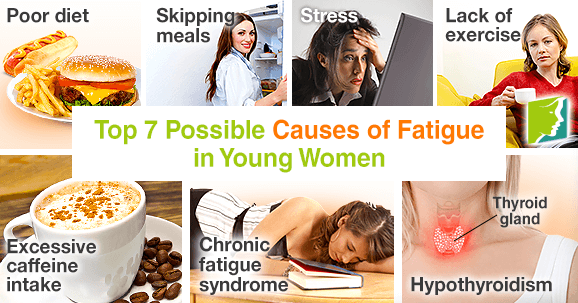Fatigue is described as the feeling of decreased energy levels, exhaustion, and tiredness. Fatigue is common among women of all ages, and is primarily caused by hormone fluctuations. Estrogen and progesterone are female hormones that have considerable effects on the body - especially when they are in flux. Young women experience fatigue during menstruation because of hormone fluctuations. Fatigue can also be caused by lifestyle factors, like insufficient sleep and poor diet. It is important to maintain a healthy and active lifestyle in order to prevent fatigue.
Poor Diet
Foods that are high in sodium, sugar, and saturated fats are all harmful to your body in excess, and they can also cause fatigue and headaches by making your body feel sluggish. It is important to include all healthy, energy boosting foods into your diet, such as nuts, salmon, Greek yogurt, and apples.
Skipping Meals
Not eating enough throughout the day causes a drop in blood sugar, which can be directly linked to headaches and fatigue. It is recommended to eat three healthy meals and small snacks throughout the day, about three to four hours apart, to boost energy levels.
Excessive Caffeine Intake
Caffeine dehydrates the body very quickly, which is a leading cause of fatigue. That being said, drinking too many cups of coffee, soda, or tea can lead to fatigue.
Lack of Exercise
An inactive lifestyle increases the frequency of fatigue and generally weakens the body. Studies have shown that getting regular exercise (i.e., at least five times a week) helps increase energy levels up to 20%, improves mood, reduces stress, and improves the efficiency of the heart, lungs, muscles, and joints. Exercising regularly also helps you achieve a good night's rest.
Stress
Stress causes difficulty sleeping and drains energy levels. It is vital to reduce and manage stress as much as possible in order to prevent fatigue. A few helpful stress reducers are yoga, walking, meditating, listening to music, and making time to see friends.
Chronic Fatigue Syndrome
This is a rare condition that affects approximately four to eight of every 1,000 adults. Chronic fatigue syndrome results in constantly being exhausted. The cause, however, is still unknown.
Hypothyroidism
Hypothyroidism is a condition caused by an underactive thyroid, which means the thyroid gland does not produce enough hormones. Hypothyroidism typically causes fatigue.
Fatigue affects more than two-thirds of women and can considerably impact their ability to perform daily tasks. It is important to be aware of the possible causes of fatigue in order to prevent it. Living a healthy and active lifestyle is crucial for boosting energy levels and avoiding fatigue. Maintaining a balanced diet is also important because what you eat directly correlates to how you feel throughout the day. Read more about what habits to cut out to prevent fatigue.
Sources
- Harvard Health. (2011). Fight fatigue by finding the cause. Retrieved November 28, 2014, from http://www.health.harvard.edu/blog/fight-fatigue-by-finding-the-cause-201107062952
- National Health Service UK. (2013). Why am I tired all the time? Retrieved November 28, 2014, from http://www.nhs.uk/Livewell/tiredness-and-fatigue/Pages/why-am-I-tired.aspx
- National Institutes of Health. (2014). Fatigue. Retrieved November 28, 2014, http://www.nlm.nih.gov/medlineplus/fatigue.html




